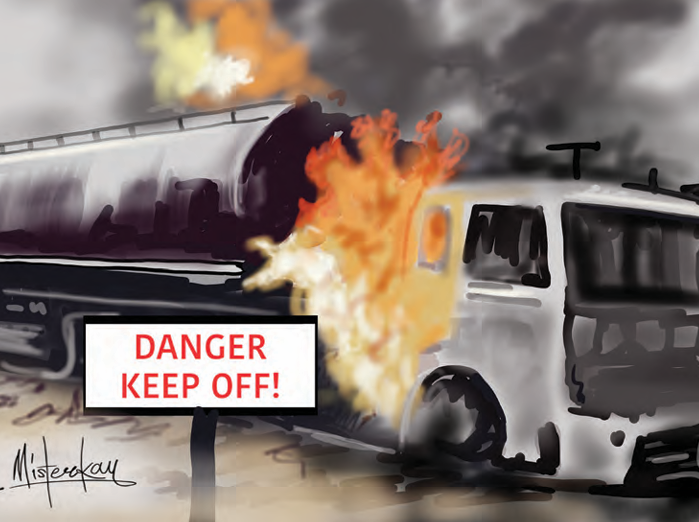Last Saturday, the Kaduna-Abuja Road, precisely Dikko junction in Niger State, was turned into a human barbecue, following the explosion of a petrol tanker. The explosion was made possible due to the activities of desperate residents scooping fuel from the fallen vehicle. Within a twinkling of an eye, nearly 100 were roasted to death, while nearly half of the dead were rushed to various medical facilities in Abuja and Suleja for quick medical attention.
For a country that saw over 100 of its citizens incinerated in Jigawa State in October last year, Saturday’s incident has been described as one too many. Not many are convinced that something has been done to avert the next tragedy waiting to happen. Like previous efforts deployed to find causes behind past incidents, this, too, shall pass away with no concrete suggestion on how to check further similar incidents.
Hair-raising Carnages
Following the removal of the oil subsidy by President Bola Ahmed Tinubu on May 29, 2023, the price of petroleum products hit the roof, driving many to risk their lives when confronted with the opportunity to scoop fuel, especially during incidents involving trucks carrying petroleum products. It is now a common occurrence that when fuel trucks are involved in accidents, many at the venue of the incidents are often involved in stealing the content of the fallen oil tanker. That explains why the country has always experienced explosions that often turn into national tragedies.
Records have it that in 2020 alone, no fewer than 550 people lost their lives in various tanker explosions that rocked various parts of the country. Recently in Jigawa State, no fewer than 150 persons were incinerated to death when a fallen patrol tanker exploded after residents stormed the scene to help themselves with fuel that was running down the road as a flowing stream. Not mindful of the dangers that have always trailed such incidents, Nigerians seem to be oblivious of the concomitant actions that often lead to the death of many, Last Saturday’s tanker explosion recalled to memory the desperation demonstrated by the citizens to seize any available opportunity to make quick money, even if that may lead to death.
The Survival Instinct
Those who are quick to defend the illegal actions of fuel truck in exploiting the content of fallen fuel trucks are often described as doing that to survive the desperate measures imposed by the harsh economic realities. How residents turned a blind eye to the glaring dangers of a possible explosion when what is only needed is a spark that could set the entire area into an inferno. The 60,000-litre-carrying fuel truck, after flopping over the road, exploded at Dikko Junction, carrying 60,000 litres, after it flopped over the road and incinerated young men, among others. Video clips of these desperate people running around to fetch the flowing fuel, no doubt, served as a prologue to the tragedy that turned the area into a fiery furnace. The Niger State Emergency authorities disclosed that it buried 86 burnt corpses between Sunday and Monday this week.
Reviewing Values
The reaction of the public for safety is best described as non-existent. That explains why past tragedies continue to be repeated. What is lacking is the absence of values that promote a sense of value for the lives of citizens. Considering the number of people killed in over 20 years of insurgencies, a one-time tragedy involving the death of people is considered not tragic enough if such an incident could create an opening for some people to alleviate the pangs of hunger ripping the citizens.
The quest for fuel had taken a turn for the worse when in May 2023, President Tinubu abolished the fuel subsidy regime, driving up food and transport costs. Calling on the need to expand the information horizon to enlighten the citizens on why they should avoid fallen oil trucks, the president ordered a national campaign to “raise public awareness about the severe risks and environmental dangers of scooping fuel from fallen tankers”.
Before now, there have been lamentations over the number of avoidable deaths linked to tanker explosions. Over 1,600 people have lost their lives in 10 years. Many Nigerians are at sea as to why these catastrophes persist despite the high death toll that often accompany these recurring tragedies of monumental proportion. Perhaps lives have become so cheap, short and brutish that impoverished Nigerians are willing to risk anything to survive the hard times.
There’s a need for people to know that avoiding dangers in the short-run is far better than plunging in the race to access fuel from a fallen tanker. People must exercise caution and avoid walking into danger. There’s a need to review safety measures, including posting security officials to junctions where these incidents are likely to play out. New orientation should be introduced to assist citizens to align with new measures aimed at promoting personal safety in times of emergencies. The citizens must resolve to walk a new staircase where values for human lives are sacrosanct in order to build positivity in citizenry mindsets.
The time has come for both the government and the citizens to wade into the matter to avert further carnage on our roads. The efforts needed to achieve this cannot be left to the government alone. The citizens must play their part and be responsible for their safety.





